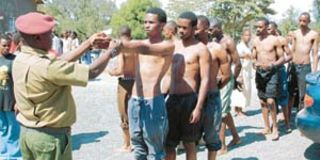Premium
Police in new bribery scandal over recruits

A General Service Unit officer examines one of the job-seekers who turned up for the recruitment.
The recent police recruitment drive was riddled with corruption and the whole exercise should be cancelled, graft czar Aaron Ringera said yesterday.

A General Service Unit officer examines one of the job-seekers who turned up for the recruitment. Photo by Joseph Kiheri
The public interest in having a clean police force demanded such drastic action in spite of the cost, he said.
Open bribery and canvassing were rife and some of the recruiting officers were even video-taped demanding or receiving bribes from people hoping to join the police.
Other officers who were not part of the recruiting team visited interview centres to lobby for their children, relatives and friends to get the jobs, he said.
Corrupt officers were demanding Sh100,000 to guarantee jobs for women applicants and up to Sh70,000 for men, according to some of the people who turned up at the recruitment centres.
Eighty percent of the recruitment at sample centres monitored by corruption watchdogs was tainted, Mr Ringera said.
Kenyans cannot expect the new officers recruited through such a corrupt system to uphold ethics and integrity, added the Kenya Anti-Corruption Commission director.
Mr Ringera's revelations will further dent the image of the police department which has for the last five years in a row been ranked the most corrupt institution in Kenya by graft watchdogs Transparency International.
The police topped the TI list again in a new report released on December 10 by the watchdog's local executive director, Mr Mwalimu Mati.
The latest recruitment drive was carried out by officers from outside the Kenya Police College in Kiganjo following previous complaints of corruption and favouritism.
Police commissioner Mohamed Hussein Ali said last night that the allegations were serious and he asked Mr Ringera to provide the evidence.
"In the absence of credible evidence, the Kenya Police cannot at the present time comment on the veracity of these allegations," Maj Gen Ali said in a statement signed by police spokesman Jaspher Ombati.
However, he promised to prosecute any officer who will be found to have been involved in corruption or other wrong doings during the recruitment "once concrete evidence was provided."
He also promised to make public any evidence Mr Ringera provides.
Maj Gen Ali added that he had invited the anti-corruption commission, the public and anyone else to monitor the recruitment and submit a report to him.
He had also warned the recruiting officers to conduct the exercise openly and transparently in the presence of the media.
Mr Ringera made public his allegations in a Press release to all major media houses, even as senior officers at police headquarters were sorting through the names of the applicants to decide if they qualified for the job.
New officers
A high number of youths wanting to join the police marked this year's recruitment which began on December 5 and ended only on Tuesday. More than 2,500 job seekers turned up at some centres yet only 3,000 new officers were needed countrywide.
Six hundred women were recruited while the rest were men.
Some 1,600 recruits were scheduled to report to the Kenya Police College at Kiganjo, Nyeri, while the other batch of 1,400 will report to the GSU Training College at Embakasi, Nairobi.
After police salaries were raised by 115 per cent across the board, when President Kibaki came to power in 2002, the starting salary of a constable straight from Kiganjo was raised from Sh4,700 to Sh10,000. Maj Gen Ali announced the recruitment drive after President Kibaki presided over a pass-out parade at Kiganjo in September and disclosed that the Government would increase the number of recruits from 2,000 annually to 4,000 to reduce the big staff shortfall.
Soon afterwards, Maj Gen Ali said they would recruit 4,000 officers but later reduced the figure by 1,000.
In his statement alleging widespread corruption Mr Ringera said his officers carried hidden video cameras as they monitored and filmed the recruitment drive at 15 out of the 80 centres nationwide.
"From the commission's own observations in those centres, the exercise was riddled with outright bribery, canvassing and influence peddling," he said.
He went on: "In the commission's opinion, 80 per cent of the recruitment was tainted."
Unlike in the past, the recent recruitment was coordinated by officers from police headquarters and hand-picked officers, precisely to avoid the corruption and favouritism which had dogged previous recruitment drives.
Three days before the exercise begun, Maj Gen Ali met all the 66 recruiting officers in Nairobi and warned them not to engage in corruption or other malpractices.
Despite his warning, some officers visited recruitment centres to push for their relatives to get jobs.
Mr Ringera said they will compile a detailed report on the malpractices and send it to Maj Gen Ali.
He said undercover anti-graft detectives monitored the recruitment in selected centres across the country in line with the commission's mandate to spearhead integrity in public service.
They visited centres in Bomet, Garissa, Gucha, Kiambu, Kitui, Lugari, Malindi, Meru North, Meru South, Mombasa, Nairobi, Nyando, Nyeri, Taita Taveta, and Vihiga,
"A detailed report will be furnished to the commissioner of police for the punishment of the concerned officers who were caught on video or are otherwise identifiable," Mr Ringera said.
He went on: "It is very clear to the commission that the noble intentions and the clear instructions of the commissioner of police to his officers for a transparent and meritocratic exercise were more honoured in the breach than in the observance."
Mr Ringera said reports flowing into the commission's Integrity Centre headquarters from all parts of the country were alarming because they suggested the malpractices were widespread.
In such circumstances, he said, it was against the public interest of a nation that aspires to zero tolerance of corruption plus integrity in the public service to uphold the results of a contaminated exercise.
"Kenyans cannot expect officers recruited in such a manner to uphold any ethics and integrity in their future careers. A stream of law enforcement has been polluted at the source," Mr Ringera said.
He asked the Government to nullify the entire exercise without prejudice to any other action that may be taken against the officers implicated in the malpractices.
He said: "Such a decision will be a painful one to take as it will be hard on those Kenyans who have been selected on merit, it will be financially expensive as the costs attendant to the recruitment will have been wasted, and it will result in delay in filling up the ranks of the police force."
However, all the above considerations were outweighed by the public interest in clean police recruitment, Mr Ringera said.
People who were asked to give bribes or those who witnessed canvassing were asked to report to Integrity Centre to help investigations.
Several cases were reported of police officers turning up at the recruitment centres to lobby for their children, relatives or friends to get the jobs.
And a number of arrests were made during the recruitment exercise when people were caught behaving corruptly.
One GSU officer believed to have received a Sh30,000 bribe from an applicant was arrested in Bomet.
Blew the whistle
The applicant blew the whistle when the corporal from the GSU Training School in Nairobi failed to fulfil the promise.
Another officer, in charge of a police station in Nyeri District, was arrested in Nanyuki when she allegedly tried to influence recruiting officers to take her relative.
In another incident, a CID officer based at Athi River was arrested on December 9 in Murang'a Town as he was going through the papers of a woman candidate who had lined up for screening at Ihura stadium.
In Embu, a senior police officer was suspended after he interfered with the recruitment by forcing the recruiting officers to employ a relative.
In Bomet and Buret districts, five candidates were arrested when they presented forged examinations certificates to the recruiting officers.




